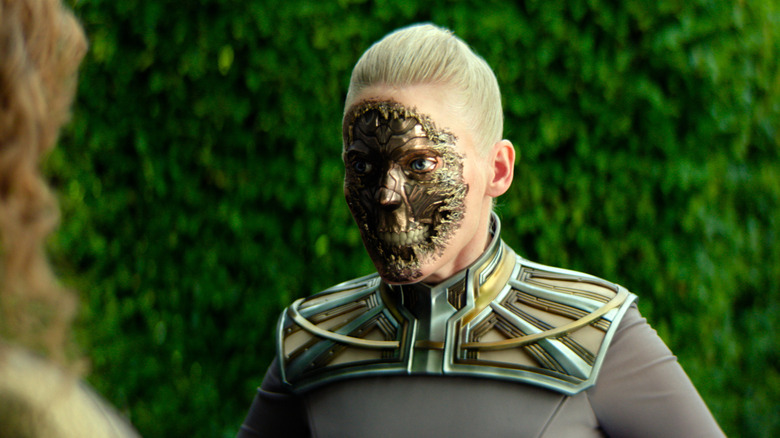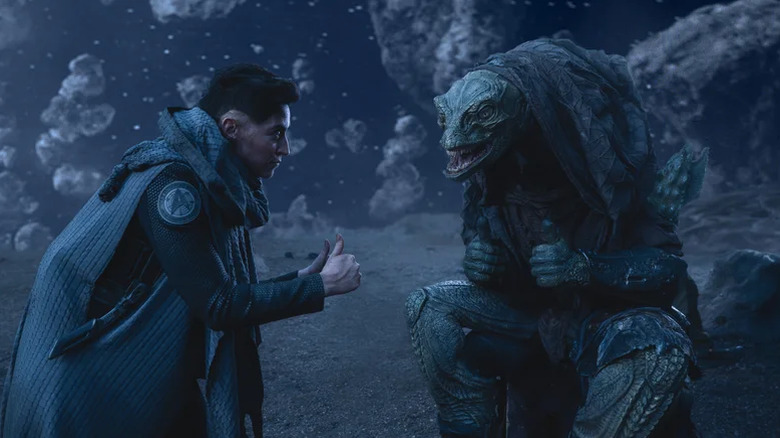Star Trek, Alien, And Foundation: We're Living In A New Sci-Fi TV Golden Age
The era of streaming has given us as many blessings as it has problems. There are far more options to choose from, as well as a larger number of genre shows with big budgets than ever before. This is particularly true when it comes to science-fiction shows. Now that visual effects have more or less caught up to storytellers' imaginations, these series are capable of delivering epic stories set in fully realized and fantastical worlds.
Really, it's a new Golden Age of sci-fi on television, as evidenced by the second half of 2025 alone. While this year has already given us one of the best TV shows of the decade, regardless of genre, in the form of "Andor" season 2, we're now got not one, not two, but three stunningly great sci-fi series airing new episodes back-to-back-to-back each week. Of course, I'm referring to "Alien: Earth," "Star Trek: Strange New Worlds," and "Foundation."
These three sci-fi shows have realized the potential of streaming, affording their creatives the room and finances to tell stories that wouldn't be possible on traditional TV networks. Take "Foundation," a series based on Isaac Asimov's epic book saga of the same name, itself long considered unadaptable due to the huge scale of its narrative. Or how about "Alien: Earth," a show that successfully brings the exquisite production design and aesthetic of Ridley Scott's classic "Alien" to the small screen. Then we have "Star Trek: Strange New Worlds," a series that provides the variety of storytelling found in "Star Trek: The Original Series," but with the polish, scale, and production values of a modern blockbuster (resulting in the best "Star Trek" show in decades).
Not only do these three shows take very different approaches to science-fiction (offering viewers a taste of the versatility of the genre), but they also have the funding they need to fully realize their visions — something that has only become commonplace in the era of streaming. Basically, there's a story for every kind of sci-fi audience, and that rules.
Better CGI and budgets have forever changed sci-fi on TV
Science-fiction has always been a part of the history of television. The genre has also been at the forefront of the development of visual and special effects on TV, from puppetry and models to stop-motion, costuming, and even the advent of computer-generated images (which have only gotten bigger and more complex with each passing decade).
By that same token, one of the biggest trends of the past 15 years has been the movie-fication of TV when it comes to scale and budget. Shows like "Game of Thrones" were among the first to incorporate feature film-level visual effects, sets, and casts, telling stories at such a massive scale that they competed with the biggest movie blockbusters. This has only escalated in the era of streaming, as every streaming platform has competed with both other streamers and theaters to deliver the biggest spectacle. More importantly, from a creative standpoint, this has allowed modern sci-fi shows to overcome one of the biggest hurdles the genre has faced in the past, with older series having tended to age extremely quickly in terms of their aesthetics (especially in the early days of CGI).
Thankfully, we're past that, at least when it comes to sci-fi series on streaming. We've previously talked about the great collection of sci-fi shows on Apple TV+, but they're not just grounded series with exquisite writing; they're also full of spectacle and tremendous visuals, especially "For All Mankind," and "Foundation." This goes beyond any single streamer as well, as there's simply a plethora of great genre storytelling on TV right now when it comes to their visual aspects alone.
"Alien: Earth" has similarly proven to be much more than all those creatively bankrupt TV spin-offs of mega-hit movies before it, expanding on the anti-corporate themes of the previous "Alien" films while also touching upon the same ideas of biological experimentation and philosophy as Scott's "Alien" prequel duology. But more than that, "Alien: Earth" is, quite simply, a bloody good "Alien" project that looks just as great as the feature films before it (with its fifth episode even going so far as to give us something we've never seen before: a Xenomorph running scared).
The lack of network TV restrictions make for better shows
When it comes to "Foundation," the Apple TV+ series is telling its story on a scale larger than just about anything else on either TV or the big screen at this point in time, with its narrative spanning millennia and a multitude of fantastical worlds. The show recalls Denis Villeneuve's "Dune" movies in the way that it gives its sci-fi source material the blockbuster treatment, with epic space battles, grounded war zone action scenes featuring lots of practical effects, and even the Death Star-like destruction of planets. This is a show that effectively changes much of its cast season after season each time it jumps ahead more than a century — something that simply could not be done before streaming with this level of production values.
Similarly, "Strange New Worlds" manages to take the format of "The Original Series," which involves telling vastly different stories embodying a range of tones and genres each week, and make it feel fresh. The third season alone include a murder mystery, a tomb-raiding adventure straight out of "Indiana Jones and the Last Crusade," a zombie-themed thriller, and even a mockumentary episode. In the era of studio-lot filmmaking, these types of episodes were merely the result of TV productions taking what they could find in the archives and making something for cheap every week. But free of the restraints of network TV, particularly when it comes to resources, sci-fi shows on streaming can take better advantage of their assets. Indeed, as often as folks tend to lament the loss of the 22-episode season in the era of streaming (and for fair reason), the sci-fi genre has arguably benefitted from shorter, more focused, and bigger-budgeted installments.
Take "Strange New Worlds," a show that could have offered the same variety of storytelling on traditional network TV but would have had to make sacrifices in order to sustain that many episodes. That's not the case on streaming, though, where shorter seasons tend to result in better, and more beautiful-looking, episodes overall. To be sure, every episode of the series is filled with meticulous effects-heavy shots that set the stage for an epic space-set adventure, complete with the requisite changes in sets, costumes, and even lighting. That's not to mention the visually stunning practical effects, like the phenomenal ones used to bring aliens such as the Gorn to life (complete with animatronic heads that look like something out of "The Dark Crystal"). That this show has lasted three seasons (on its way to a fifth and final one), combined with the fact that other ongoing sci-fi series look just as good and do things just as cool on a weekly basis, is truly a gift to fans of the genre.


